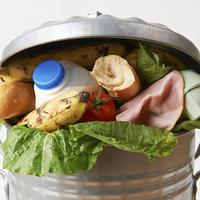I wanted to share a couple of `controversial' food related stories that have cropped up recently – although you will probably not find them controversial if you are an economist. Because in one way or another they relate to the concept of opportunity costs: the idea that the benefits of a policy – such as food waste reduction or non-GM agriculture – cannot be judged in isolation, but must take into account the benefits forgone by not choosing the alternative.
Optimal Levels of Food Waste
Most people have a visceral reaction to the idea of waste, and food waste in particular. Whether you have yourself experienced hardship, perhaps have grandparents who lived through a war, or have any sense of empathy or moral obligation towards millions of people globally living in food insecure circumstances, the idea of wasting food can elicit powerful negative emotions. Mountains of perfectly good parsnips being destroyed for not being perfectly straight have sparked public outrage and a growing trend of advocacy for “zero waste” policies across the food production cycle.
However they should also evoke another sentiment: the idea that a goal blindly maximising a single measure (or minimising it in the case of waste) is very likely a recipe for the inefficient use of resources. Meaning that minimising waste must necessarily involve making choices that involve minimising some other function that we probably don't want to reduce. In a thought-provoking post Rachel Laudan recently asked Isn’t It Crucial to Have Some Food Waste? and summarised the three possibilities in any food system:
- Not enough food. Nasty.
- Just enough food. Improbable and risky.
- Too much food. A state greatly to be desired. The question is how much.
Which poses the question of what is the optimal level of waste? The answer is not clear, and as Jayson Lusk pointed a few years ago, there is a remarkable dearth of literature exploring the topic. But it should be a question we are not too squeamish to ask, recognising that (depending on your circumstances) either food security, food variety, or even food safety, are surely trade-offs that we are prepared to make – and do so on a daily basis – even if it means throwing out 'perfectly good' food.
Environmental impact of non-GM crops
The topic of GMO crops tends to evoke strong emotions that often have a similar 'purism' element to them as the sometimes almost aesthetical desire to not waste food. Again what is often ignored in such arguments are the opportunity costs of not growing GMOs. Andrew Kniss describes this eloquently using the example of US farmers being forced to abandon the environmental and social gains of GMO sugar beet farming.
With major American sugar buyers (e.g. Hershey) moving away from refined sugar produced from GM sugar beets and switching instead to refined sugar derived from non-GM sugar cane – two products that, chemically at least, are complete substitutes – the price of the latter now commands a 10 to 15 percent premium. This has meant that US sugar beet farmers, currently growing almost exclusively GM sugar beet, are now being forced to consider switching back to non-GM sugar beet in order to satisfy consumer demand.
If the farmers can manage to make the switch economically, despite non-GM requiring almost 3 times as much labour for hand-weeding, they will also be switching back to a herbicide regiment that requires 3-6 applications of 4 to 6 different herbicides per crop at 5 to 10 day intervals, often round the clock and at night. Compared to two or three applications of glyphosate and minimal hand weeding for an increased yield growing GM sugar beet. Additionally they would have to revert back to intensive tillage regime instead of the conservation tillage they are able to employ growing the GM crop, which improves soil quality, reduces erosion and improves soil moisture retainment.
But if consumer pressure prevails, the effects of the switch back to non-GM sugar beets will ironically – as it is often defended by appealing to environmental conservation principles – increase the chemical load on the produce and the environment, while reverting to a production mode that exhausts and degrades the soil and reduces its biodiversity. And it will increase exposure of farm workers to hazardous chemicals and increase amount of backbreaking manual labour and the number of family unfriendly working hours required of them.
In the end consumers may well feel these costs are offset by the perceived benefits of non-GM sugar, just like we may well find consumers are willing to compromise on variety, aesthetics, use-by dates or even price in order to reduce food waste. But there is never going to be a 'zero waste' food production system, just like there will never be a 'zero environmental impact' agriculture. The price we would have to pay is simply too high.
About the Author
Dr Maja Založnik s a demographer currently working on a joint project of the Oxford Institute of Population Ageing and the Oxford Martin Programme on the Future of Food.
Comments Welcome:
We welcome your comments on this or any of the Institute's blog posts. Please feel free to email comments to be posted on your behalf to administrator@ageing.ox.ac.uk or use the Disqus facility linked below.
Opinions of the blogger is their own and not endorsed by the Institute
Comments Welcome: We welcome your comments on this or any of the Institute's blog posts. Please feel free to email comments to be posted on your behalf to administrator@ageing.ox.ac.uk or use the Disqus facility linked below.













